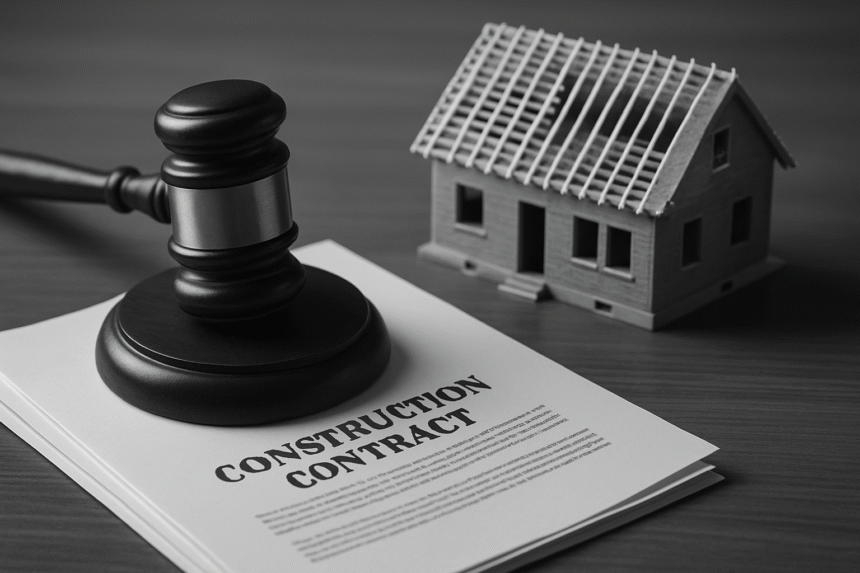What Happens If a Construction Contract Has No Completion Date? (FAQ)
Construction contracts are meant to create certainty—timelines, payments, responsibilities. But what if one crucial piece is missing: the completion date?
This FAQ breaks down the legal and practical consequences of leaving out a completion date in a construction contract. If you’re a developer, contractor, project manager, or consultant, this guide will help you understand the risks and how to address them.
Q1: Is it legal to have a construction contract with no completion date?
Yes, it’s legal—but risky.
A contract can still be enforceable without a stated completion date, but it opens the door to disputes. In many legal systems, a court may imply a “reasonable time” for completion, based on the nature of the work.
Risk: What’s considered “reasonable” is subjective. One party may expect three months, the other six.
Tip: If no date is set, courts will look at industry norms, project size, complexity, and communications between parties.
Q2: What are the consequences for the contractor?
Without a defined end date, the contractor could be exposed to:
- Claims of unreasonable delay
- Withheld payments
- Termination for breach (if delays are seen as unjustified)
If the client becomes unhappy with the pace of work, the lack of a deadline could be used against the contractor.
Mistake to avoid: Assuming that verbal agreements or vague milestones are enough to protect your position.
Q3: What are the consequences for the employer/client?
The client may also suffer:
- No clear basis for applying liquidated damages
- Difficulty enforcing timelines
- Delays in delivery affecting downstream obligations (e.g., tenants, investors)
Important: Most courts will not award penalties unless there is a written mechanism linking delay to liability.
Q4: Can a “reasonable time” be enforced in court?
Yes—but only after a lengthy legal process.
In common law jurisdictions, courts can “imply” a term that the contractor must finish in a reasonable time. However, litigation may be needed to prove what that time is.
Example: A residential project with no completion date might be judged to take 6–9 months. But if the contractor takes 14 months, the employer must show that was unreasonable.
Q5: How does this affect payment and invoicing?
Without a completion date, it’s harder to:
- Tie milestone payments to project progress
- Justify deductions or retentions
- Trigger final account or handover procedures
Solution: Even if the end date is missing, add progress-based milestones in writing—like “20% due after foundation” or “final payment upon practical completion.”
Q6: Can parties still rely on a practical completion certificate?
Yes. A practical completion certificate can serve as an informal indicator of project end. But it won’t substitute a contractual deadline.
Warning: If one party refuses to issue or accept the certificate, there’s no fallback unless a date or dispute resolution clause exists.
Q7: Can the completion date be implied from communications?
Possibly.
Courts may infer a completion period from:
- Project timelines shared by email
- Tender documents
- Programmes or work schedules
But: This is not guaranteed. It depends on whether both parties treated those communications as part of the agreement.
Best practice: Always include an explicit date or attach a schedule.
Q8: What should be done if a contract was already signed without a completion date?
You can fix it by:
- Signing an addendum with a mutually agreed completion date
- Adding a project schedule to the contract as a formal annex
- Clarifying the timeline in a change order or written instruction
Tip: Do it before disputes arise—adding dates during conflict weakens credibility.
Bonus Tip: Never Rely on Verbal Timelines
Bonus: In most jurisdictions, verbal promises about deadlines are not enough—especially in construction. Courts prioritize what’s written.
If timing is important (and it always is in construction), get it in writing. A one-line clause like “The project shall reach completion no later than 30 September 2025” can save months of legal wrangling.
Final Thoughts + Call-to-Action
A missing completion date in a construction contract creates unnecessary ambiguity, weakens your legal position, and opens the door to delays and disputes.
Whether you’re the client or the contractor, protect your time and money by setting a clear, written timeline—or updating the contract now if you forgot.
Still unsure how to fix or draft your construction agreement? Book a consultation .



Leave a Reply